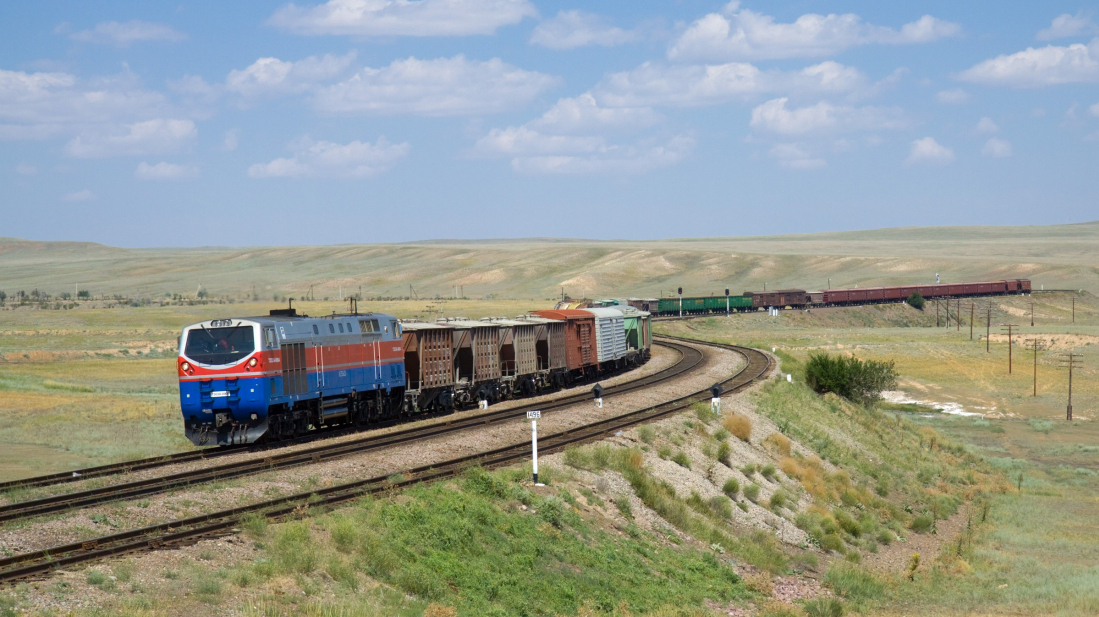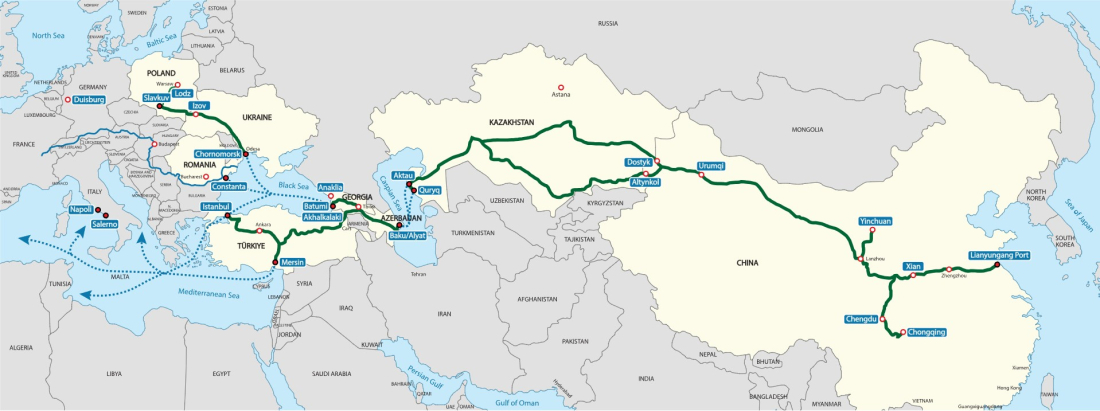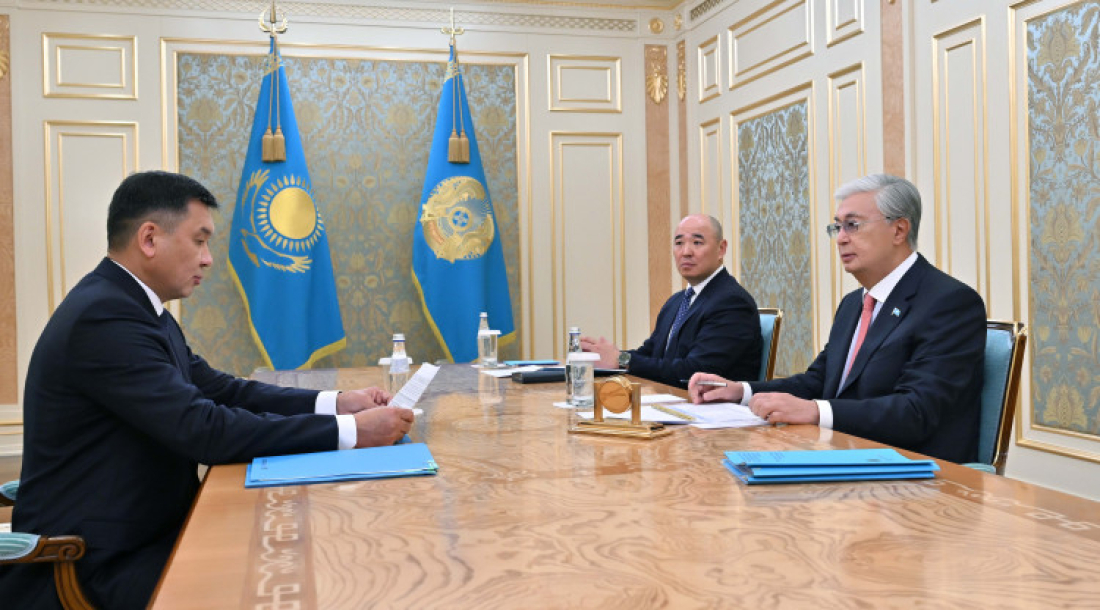U.S.-Israeli strikes on Iran: What we know so far
The United States and Israel have carried out large-scale strikes on Iranian leadership and military targets, with Iranian state media confirming t...

Kazakhstan Temir Zholy, the country's national railway company, has announced plans to construct more than 1,700 kilometres of new rail lines and upgrade 3,000 kilometres of existing ones as part of the strategic Trans-Kazakhstan Railway Corridor development.
Situated between Russia and China, Kazakhstan pursues a peaceful multi-vector foreign policy to protect its sovereignty and boost its economy through international trade. Expanding its transit potential is therefore crucial for Kazakhstan’s development. and is considered as a key strategic project.
"Transit is a significant advantage for us in the global competition for cargo transportation, and it must be fully and efficiently used. Accelerating the development of the Trans-Kazakhstan Railway Corridor is crucial, as it will serve as a key link in the Trans-Caspian route," stated Kazakh leader in January governmental meeting.
The Trans‑Kazakhstan Railway Corridor is a key segment of the Trans‑Caspian International Transport Route (TITR), also known as the Middle Corridor. Bypassing Russia, this major east–west logistics project connects China to Europe through Kazakhstan, the Caspian Sea, Azerbaijan, Georgia, and Turkey.

During a meeting with President Kassym-Jomart Tokayev today, Talgat Aldybergenov, the CEO of Kazakhstan Temir Zholy, reported that transit traffic volume via the country reached 14.6 million tons for the first half of 2025, with operational cargo turnover rose by 8.6% year-on-year.
"In collaboration with global innovation leaders, Kazakhstan is working to enhance the quality and safety of its rail transport system. The introduction of automated transit declarations along the Trans-Caspian International Transport Route has improved transparency and significantly sped up logistics operations, reducing declaration processing time from eight hours to just 30 minutes," the Presidential Office's statement reads.
Aldybergenov stated that construction of the second rail line between Dostyk and Moiynty, as well as the Almaty bypass line, is nearing completion. Meanwhile, implementation of the Darbaza–Maktaaral project is underway, and work has begun on the Bakhty–Ayagoz and Kyzylzhar–Moiynty lines.
By highlighting expansion of Kazakhstan’s terminal network, he said tha the country's presence at key cargo consolidation hubs in China, Russia, Hungary, Belarus, Azerbaijan, and Georgia helps optimize logistics and enhance transportation efficiency along the East–West and North–South corridors.

During his recent visit to Türkiye, President Kassym-Jomart Tokayev stressed that the two countries should fully capitalize a strategic geographic advantage.
“Approximately 85% of overland cargo between Europe and China passes through Kazakhstan. In this context, the development of the Trans-Caspian International Transport Route, also known as the Middle Corridor, is of particular importance. Kazakhstan is actively modernizing its railway network, constructing new roads, and upgrading infrastructure to enhance shipping across the Caspian Sea,” said President Tokayev.
As part of the visit, Kazakhstan Temir Zholy signed a cooperation agreement with the Turkish railway company TCDD Taşımacılık A.Ş. to enhance the transportation of goods along the Middle Corridor railway route.
The agreement encompasses a broad range of joint activities aimed at boosting the efficiency and competitiveness of the route, including:
- Organizing regular railway services between Kazakhstan and Turkey;
- Increasing transportation volumes on the Baku–Tbilisi–Kars railway section;
- Expanding freight capacity between China and Europe/Africa in both directions;
- Optimizing transit procedures and coordinating logistics operations to improve transportation efficiency;
- Simplifying customs and administrative processes to accelerate the cross-border passage of goods.
The companies intend to jointly develop digital solutions, including the introduction of electronic paperless document management for the effective management and tracking of containers and rolling stock.
As a multimodal route including rail, train ferries, and sea links, Aldybergenov, held talks with Ajay Kumar Singh, General Director of Mersin International Port, in Ankara to discuss creation of efficient multimodal logistics solutions along the Middle Corridor route.
Aldybergenov highlighted the strong interest and commitment to maintain stable cargo volumes and underscored the strategic role of Mersin Port as a key transshipment hub along the Middle Corridor.
Discussions also covered the port’s readiness to handle increased cargo volumes and plans to expand its capacity to accommodate growing freight traffic.
To further strengthen the logistics chain, the Kazakh side proposed leveraging the capabilities of KPMC, a joint venture between KTZ JSC and PSA International. KPMC is already actively developing multimodal transport along the China–Turkey corridor, including routes such as Izmit, Köseköy, Xi’an–Istanbul, and block trains operating along the Qingdao–Khorgos–Sergeli route.
Last week Kazakhstan railway company secured major financing to drive the project of the Trans‑Kazakhstan Railway Corridor forward.
A syndicated loan agreement with Abu Dhabi Commercial Bank and Deutsche Bank, allowing them to borrow up to 480 million Swiss francs (~US $540 million) to fund major infrastructure projects along the Trans-Kazakhstan corridor and increase capacity for transit freight traffic.
The loan has a term of three years and was arranged with the support of Kazakhstan’s sovereign wealth fund Samruk-Kazyna, which owns 100% of KTZ.
Key projects include the construction of a new line between Moiynty and Kyzylzhar and upgrades to increase capacity on congested sections of the network. KTZ says that the new loan will also be used to refinance existing debt.
Follow the latest developments and global reaction after the U.S. and Israel launched “major combat operations” in Iran, prompting retaliation from Tehran.
Governments across the region responded swiftly to Israel’s strikes on Iran, closing airspace, issuing travel advisories and activating contingency plans amid fears of escalation.
Ayatollah Alireza Arafi has moved into a pivotal constitutional role following the death of Supreme Leader Ayatollah Ali Khamenei, becoming the clerical member of Iran’s temporary leadership council under Article 111 of the Constitution of the Islamic Republic of Iran.
A senior Iranian official has warned Israel to “prepare for what is coming”, insisting that Tehran’s response to the latest escalation in the Middle East will be made openly and without limits.
Ayatollah Ali Khamenei, Iran’s supreme leader for 36 years and the country’s highest political and religious authority, has died aged 86 following joint Israeli and U.S. strikes on his compound in Tehran.
The United States and Israel have carried out large-scale strikes on Iranian leadership and military targets, with Iranian state media confirming that Supreme Leader Ayatollah Ali Khamenei was killed.
Follow the latest developments and global reaction after the U.S. and Israel launched “major combat operations” in Iran, prompting retaliation from Tehran.
Ayatollah Alireza Arafi has moved into a pivotal constitutional role following the death of Supreme Leader Ayatollah Ali Khamenei, becoming the clerical member of Iran’s temporary leadership council under Article 111 of the Constitution of the Islamic Republic of Iran.
A number of senior Iranian figures have reportedly been killed in Saturday’s joint U.S.–Israeli airstrikes on Iran, according to Iranian state media, Israeli military statements and international reporting. Some of the details remain unverified. .
The death of Iran’s Supreme Leader Ayatollah Ali Khamenei has triggered one of the most significant political processes in the Islamic Republic: the selection of a new Supreme Leader.
You can download the AnewZ application from Play Store and the App Store.

What is your opinion on this topic?
Leave the first comment